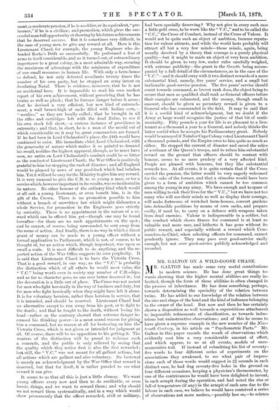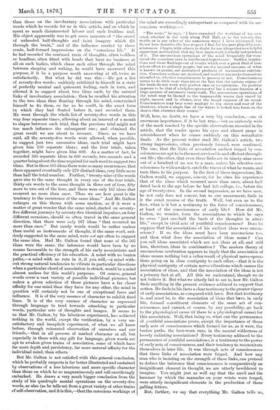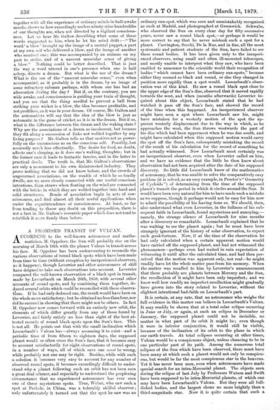MR. GALTON ON A WILD-GOOSE CHASE.
MR. GALTON has made some very useful contributions to modern science. He has done great things to- wards showing that the higher mental abilities are really in- herited, though the form of these abilities is often changed in the process of inheritance. He has done something, perhaps, towards determining the speciality of the relation between twins. He has added to our knowledge of the relation between the size and shape of the head and the kind of influence belonging to the owner of the head. But now and then he has certainly shown a disposition as well towards a superstitious attachment to impossible refinements of classification, OA towards indus- trious but uninstructive observations; and of this he seems to have given a supreme example in the new number of the Nine- teenth Century, in his article on "Psychometric Facts." Mr. Galton in this paper records the result of observations which evidently cost him a very considerable amount of effort, and which appear, to us at all events, models of unre- manerative toil. If instead of submitting his list of seventy- five words to four different series of experiments on the associations they awakened, to see what pair of impres- sions each of those words would suggest in seconds in each distinct case, he had dug seventy-five holes in the ground on four different occasions, keeping a physician's thermometer, by one of the contrivances he would have been delighted to invent, in each armpit during the operation, and had noted the rise or fall of temperature (if any) in the armpit of each arm due to the labour in each case, we believe he would have contrived a series of observations not more useless,—possibly less so,—to science
than those on the involuntary associations with particular words which he records for us in this article, and on which he spent so much disinterested labour and such fruitless zeal.
His object apparently was to get some measure of "the crowd of unheeded half-thoughts and faint imagery which flit through the brain," and of the influence exerted by these crude, half-formed impressions on the "conscious life." If he had recorded the confused train of thoughts, often bodiless or headless, often fitted with heads that have no business at
all on such bodies, which chase each other through the mind between sleeping and waking, he would have answered this purpose, if it be a purpose worth answering at all, twice as satisfactorily. But what he did was this :—He got a list of seventy-five words ; suddenly exhibited to himself in a state of perfectly neutral and quiescent feeling, each in turn, and allowed it to suggest about two ideas each, by the natural links of involuntary association; then he recalled his attention to the two ideas thus floating through his mind, constrained himself to fix them, so far as he could, in the exact form in which they had floated before it, and recorded them. He went through the whole list of seventy-five words in this way four separate times, allowing about an interval of a month to elapse between each trial, that the previous trial might not too much influence the subsequent one ; and obtained the great result we are about to recount. Since, as we have said, all the seventy-five words were allowed, when possible, to suggest just two successive ideas, each trial might have given him 150 separate ideas ; and the four trials, taken together, might have given him 600. As a matter of fact, he recorded 505 separate ideas in 660 seconds, two seconds and a quarter being about the time required for each word to suggest two ideas. But in these 505 ideas there were so many recurrences, that there appeared eventually only 279 distinct ideas, very little more than half the total number. Further," twenty-nine of the words gave rise to the same thought in every one of the four trials, thirty-six words to the same thought in three out of four, fifty more to two out of the four, and there were only 167 ideas that recurred no more than once. Thus we see how great is the tendency to the recurrence of the same ideas." And Mr. Galion enlarges on. this theme with some unction, as if it were a matter of great wonder that the same mind, started on seventy- five different journeys by seventy-five identical impulses, on four different occasions, should so often travel in the same general direction, that there were only 167 ideas "that occurred no more than once." But surely words would be rather useless than useful as instruments of thought, if the same word, sud- denly suggested to the same mind, were not apt often to suggest the same idea. Had Mr. Galton found that none of the 505 ideas were the same, the inference would have been by no means favourable to the strength of his early associations and the practical efficiency of his education. A mind with no beaten paths,—a mind with no ruts in it, if you will,—a mind with- out strong natural tendencies to vibrate in particular directions when a particular chord of association is struck, would be a mind almost useless for this world's purposes. Of course, general words cover a vast variety of possible individual pictures, but unless a given selection of those pictures have a far closer affinity for one mind than they have for any other, the mind in question will certainly not be one of exceptional force and influence. It is of the very essence of character to exhibit fixed lines. It is of the very essence of character as expressed through language to tend towards attaching to particular words, particular sets of thoughts and images. It seems to us that Mr. Galton, by his laborious experiment, has achieved nothing in the world, except the verification, by a very un- satisfactory and inexplicit experiment, of what we all knew before, through reiterated observation of ourselves and our friends,—that in all persons of marked character at all, but especially in those with any gift for language, given words are apt to awaken given trains of association, some of which have far more depth and persistency, far more natural affinity for the individual mind, than others.
But Mr. Galion is not satisfied with this general conclusion, which he probably suspects is far better illustrated and sustained by observations of a less laborious and more specific character than those on which he so magnanimously and self-sacrificingly embarked. He draws a very mueh bigger conclusion from the study of his quadruple mental operations on the seventy-five words, as also (as he tells us) from a great variety of other trains of self-observation, and it is this,—that the conscious workings of the mind are exceedingly unimportant as compared with its un- conscious workings :—
"The more," he says, "I have examined the workings of my own mind, whether in the walk along Pall Mall, or in the seventy-five words, or in any other of the numerous ways I have attempted, but do not here describe, the less respect I feel for the part played by con- sciousness. I begin, with others, to doubt its use altogether as a helpful supervisor, and to think that my best brain-work is wholly independent of it. The unconscious operations of the mind frequently far tran- scend the conscious ones in intellectual importance. Sudden inspira- tions and those flashings-out of results which cost a great deal of con- scious effort to ordinary people, but are the natural outcome of what is known as genius, are undoubted products of unconscious cerebra- tion. Conscious actions are motived, and motives can make themselves attended to, whether consciousness be present or not. Consciousness seems to do little more than attest the fact that the various organs of the brain do not work with perfect ease or co-operation. Its position appears to be that of a helpless spectator of but a minute fraction of a huge amount of automatic brain-work. The unconscious operations of the mind may be likened to the innumerable waves that travel by night, unseen and in silence, over the broad expanse of an ocean. Consciousness may bear some analogy to the sheen and roar of the breakers, where a single line of the waves is lashed into foam on the shores that obstruct their course."
Well, here, no doubt, we have a very big conclusion,—one of enormous importance, if it be but true,—but so curiously wide of the mark reached by the specific observations recorded in the article, that the reader opens his eyes and almost gasps in astonishment when he comes suddenly on this remarkable finale. As the present writer read Mr. alton's article, two strong impressions, often previously formed, were confirmed. The one, that the links of association earliest forged by con- sciousness are apt to be the most serviceable and efficient through- out life ; the other, that even these links are in ninety-nine cases out of a hundred of no use to a man, unless his selective con- sciousness be wide awake to catch the traces of what he wants, and turn them to his purpose. In the first of these impressions, Mr. Galton would, we suppose, concur, for he cites his experience that of the ideas which recurred more than once, about half dated back to the age before he had left college, i.e., before the age of twenty-two. In the second impression, as we have seen, he not only does not concur, but to our amazement, finds in it the exact reverse of the truth. Well, but even as to the first, what is it but a testimony to the force of consciousness, at least of the consciousness of early life P How did Mr. Galton, we wonder, form the associations to which he says he owes "just one-half the basis of the thoughts in after- life," except in vivid acts of youthful consciousness? Does he suppose that the associations of his earliest ideas were uncon- scious? If so, the ideas must have been unconscious too, and then what does the association of ideas mean?' Can you call ideas associated which are not ideas at all, and still less, therefore, ideas in combination ? The modern theory of unconscious cerebration appears to imply that the association of ideas means nothing but a reflex result of physical nerve-opera- tions going on in close contiguity to each other,—that it is the physical contiguity of certain nerve-vibrations which causes the association of ideas, and that the association of the ideas is not a primary fact at all. All this we understand, though we do not believe it. But what we utterly fail to see is, how Mr. Galton finds anything in the present evidence adduced to support that notion. He finds in his facts a clear testimony to the greater vigour of early associations, as compared with later. But that testimony is, and must be, to the association of ideas that have, in early life, formed constituent elements of the same act of con- sciousness, and cannot, of course, by any possibility, go back to the physiological cause (if there be a physiological cause) for this association. Well, that being so, what can the permanence of youthful associations prove, except the importance of those early acts of consciousness which formed for us, as it were, the beaten paths, the best-worn ruts, in the mental wilderness of loosely radiating associations? Every testimony adduced to the permanence of youthful associations, is a testimony to the power of early acts of consciousness, and their tendency to reconstitute themselves in later life. It was through acts of consciousness that these links of association were forged. And how any man who is insisting on the strength of these links, can pretend to deduce the inference that consciousness is comparatively an insignificant element in. thought, we are utterly bewildered to imagine. You might just as well say that the anvil and the hammer by which the manacles on your wrists were forged, were utterly insignificant elements in the production of those galling fetters.
But, further, we say that everything Mr. Galton tells us,, together with all the experience of ordinary minds in half-awake moods, shows us how exceedingly useless ninety-nine hundredths of our thoughts are, when not directed by a vigilant conscious- ness. Let us hear Mr. Galton describing what some of these words suggested to him, when he let his mind drift :—" The word a blow' brought up the image of a mental puppet, a part of my own self who delivered a blow, and the image of another who received one; this was accompanied by an animus on my part to strike, and of a nascent muscular sense of giving a blow." Nothing could be better described. That is just the way a word uttered in one's presence when one is half asleep, directs a dream. But what is the use of the dream? "What is the use of the "nascent muscular sense," even when accompanied, as it probably is in the dream, by an image of some refractory cabman perhaps, with whom one has had an altercation during the day ? But if, on the contrary, you are wide awake, and consciousness is guiding your train of thought, and you see that the thing needful to prevent a ball from striking your wicket is a blow, the idea becomes profitable, and not profitless, as it was in your dream. Of course, Mr. Cl alton and the automatists will say that the idea of the blow is just as automatic in the game of cricket as it is in the dream. But if so, what is the difference between the dream and the waking state ? Why are the associations of a dream so incoherent, but because they flit along a succession of links not welded together by any living purpose? Mr. Galton tells us that motives act as power- fully on the unconscious as on the conscious self. Possibly, but assuredly much less effectually. The desire for food, no doubt, affects one's sleeping, as it does one's waking, thoughts ; but in the former case it leads to fantastic fancies, and in the latter to practical deeds. The truth is, that Mr. Gallon's observations are only a monument to his own disinterested industry. They prove nothing that we did not know before, and the crowds of ungoverned associations, on the wealth of which he so fondly dwells, are no more closely connected with our useful conscious intentions, than straws when floating on the wind are connected with the bricks in which they are welded together into hard and solid structures. Bonds of association begin in acts of con- sciousness, and find almost all their useful applications when under the superintendence of consciousness. At least, so far from tending to throw any doubt- on this proposition, there is not a fact in Mr. Galtou's eccentric paper which does not tend to establish it more firmly than before.




































 Previous page
Previous page